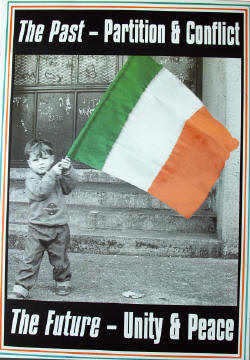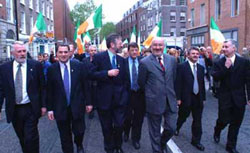 |
Irisch
Republikanische Solidarität
|
 |
Sanctions body may be rigged to appease unionists
There have been reports that the role of the Irish government in a
planned International Independent Monitoring Body (IMB) could be
further reduced in order to appease unionist hardliners.
The body has been designed in response to demands by Ulster Unionist
leader David Trimble for a mechanism to exclude Sinn Fein from
government following allegations of continuing IRA activity.
Mationalists have seen its establishment as another sop by the British
government to rejectionist unionism.
They view the IMB as a discriminatory, anti-democratic mechanism
designed to place further burdens on the nationalist electorate
exercising their right to democratic representation.
A new international treaty could bring the IMB into being within a
week. However, revisions are said to be continuing following criticism
of the plan by David Trimble's former deputy, John Taylor.
Taylor has threatened to scupper the entire Good Friday Agreement if
the proposed Independent Monitoring Body included a nominee from the
Dublin government. His hostility is based on opposition to even the
appearance of a nationalist dimension within the IMB.
In a move to appease Mr Taylor and others like him, the British
government is set to exercise complete control over the actions of the
IMB, with Dublin's single token representative on the body having no
direct role in the body's adjudications.
Furthermore, the IMB must report directly to the British Secretary of
State, who has ultimate power to decide to act or ignore the IMB.
Sinn Fein Fein chief negotiator Martin McGuinness has accused the
British government of being "mesmerised by the divisions within
unionism".
"Despite British government denials, everyone knows that their refusal
to accord the electorate their right to vote is in part driven by the
crisis within unionism," he said. "Where else would a key democratic
process be suspended because of the internal difficulties of one
political party? Where else would an election be cancelled because the
outcome is not acceptable to a government?
"The British government is mesmerised by the divisions within the
UUP.
The peace process and the implementation of the Good Friday Agreement
have been frozen as a result. This inertia in the peace process has
caused a dangerous crisis which others, opposed to political progress,
have sought to fill. This includes people in the British system."
Mr McGuinness praised the efforts of activists and republicans who
helped ensure the Protestant marching season was less violent than
before.
"Their efforts and energy is in stark contrast to the political inertia
of the British government," he said.
"If the crisis in the political process is to be resolved the British
government must end its patronage of the Ulster Unionist Party. A firm
date for the postponed election must be set. The British government's
moratorium on politics must be ended."
In New York, Sinn Fein President Gerry Adams has told President Bush's
special envoy, Richard Haass, of the widespreead demand in the US for
the election to go ahead.
Speaking after their meeting, Mr. Adams said everyone he had spoken to
in the US believed that the political imperative was for the British
government to set a "date certain" for the election to the Belfast
Assembly.
"I told Richard Haass this. I also told him that we welcome Mr. Blairis
statement on Wednesday. I hope this is evidence of the British
government realising that the cancellation of the elections was a
mistake.
"The logic of Blair's position is that he should set a date certain
for
the elections and that in his words we can see the political
institutions back up and running again."
ORDE CRITICISED
Meanwhile, Sinn Fein's Gerry Kelly has accusing PSNI Chief Constable
Hugh Orde Orde of "political intervention and electioneering"
following
a controversial newspaper interview this week.
Orde claimed that the IRA had carried out more punishment beatings in
the last few months. He also claimed this was because there was no
imminent prospect of assembly elections, and so it would not damage
Sinn Fein.
"When Hugh Orde came here he said he was a policeman, not a politician.
His interview... was very political, all against Sinn Fein," he said.
"He came here, he says, to change the RUC but unfortunately I think
the
RUC changed him."
"We are against punishment beatings or shootings. If you look at
the
statistics over a number of years, they have decreased because we have
supported other alternatives to this type of punishment.
Letzte Änderung:
06-Sept-03